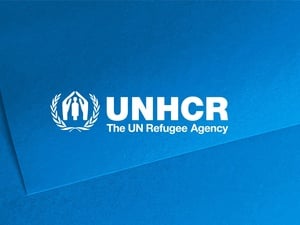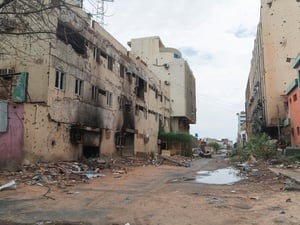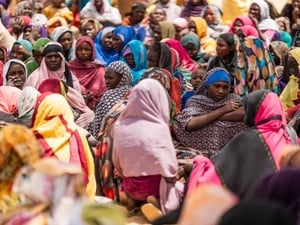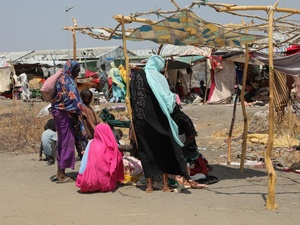Lost and found: a Libyan's despair turns to elation in Egypt
Lost and found: a Libyan's despair turns to elation in Egypt

Awad reunited with his daughter Fatima. The engineer from Ajdabiya finally caught up with his family in Egypt after four harrowing days of searching.
MARSA MATROUH, Egypt, March 25 (UNHCR) - When Awad,* saw what had happened to his house in the embattled Libyan town of Ajdabiya, the stucco walls a pile of rubble and the roof destroyed by an incoming shell, his heart sank.
He asked a neighbour if anyone had seen what happened to his family. No one knew. For the next four days he hunted for them, with mounting desperation, across eastern Libya. He crisscrossed front lines as the fighting between government and opposition forces and nightly raids from aircraft enforcing a United Nations imposed no-fly zone intensified.
He finally found them earlier this week, sheltering a couple of hours drive from the Libyan border in the Egyptian seaside resort of Marsa Matrouh. "I can breathe again," he said, cradling his youngest daughter, Fatima,* in his arms.
Awad is one of thousands of Libyans who have been displaced by the internecine fighting in Libya and to be afflicted by fears of what will happen next. Most have fled to other towns within Libya, where they have reportedly received a warm welcome, including offers of apartments, free fuel, even cash.
But others, like Awad and his young family, have decided to flee to neighbouring countries for as long as the conflict lasts. A little more than 1,000 Libyans have been crossing into Egypt each day.
None of them knows when they will be able to return home. "I am so afraid: I just look at the TV and wait," said one man, who arrived in Egypt on Monday. "I am lost, I don't know what to do." Awad says he won't go back so long as Libyan leader Muammar Gaddafi is in power.
In the meantime, many other families are being separated from their loved ones by the conflict. Another man from Ajdabiya, the town worst affected by fighting in recent days, said he had travelled to Egypt to find his family without success and was now going back to Libya to continue the hunt. And one of Awad's cousins has two sons who disappeared without trace a fortnight ago.
Awad's own trials began a week ago when his wife in Ajdabiya called him at the petroleum plant in the desert where he worked as an engineer. She said their home town was under heavy attack from Gaddafi's forces. Awad left immediately, travelling overnight, and reached the town in the morning. At a roadblock manned by pro-Gaddafi troops his papers were taken from him.
When he got to his house, Awad said, "the roof was caved in by a rocket. I found nobody inside." The rest of Ajdabiya, he said, was almost empty of civilians. The hospital had been hit repeatedly by shells.
"I asked a neighbour, 'Where is my family? Where are they?'" One suggested an oasis town. Awad left for Tobruk, a town to the east. On his way, a convoy of about 80 vehicles from Gaddafi's forces came hurtling towards him.
"I was expecting to be shot. I was expecting death," he recalled. But they passed by and a few minutes later he encountered a smaller convoy of about 10 vehicles driven by anti-government forces, who asked if he needed help.
Travelling on to Tobruk, he searched for his family without joy. An acquaintance again mentioned an oasis town in the desert, but after another overnight journey there, he returned empty handed. "I looked everywhere. I thought they had been killed," he said.
Awad journeyed back to Tobruk and finally decided to continue his search in Egypt. The young engineer has a large family, including eight brothers and their children. He has four of his own. Hundreds of the Libyans crossing into Egypt end up in Marsa Matrouh, about two-and-a-half hours from the border.
So Awad went there and visited a devout Bedouin landowner who is putting up dozens of families from Libya in his apartments. Awad went to his office, located opposite a mosque on the coast road to Alexandria, and was told that a family had arrived several days earlier. It was them. "I was reborn again," he said.
They too were relieved. "We had given up hope for him," his brother said. Each of his two daughters, aged five and eight, clung firmly to a knee as UNHCR visitors talked with Awad.
UNHCR is monitoring the displacement in Awad's homeland, helping identify lost family members, and providing assistance to the displaced.
* Names changed for protection reasons
By Andrew Purvis in Marsa Matrouh, Egypt
UNHCR Hotline numbers:
In Libya
Land line:+218-21-4777503 (24 hours)
Mobile:+218-92-552-3671 (9:00 to 14:00 hours)
Mobile:+218-91-444-31-94
Mobile:+218-92-686-23-38
In Geneva
+41 22 739 8855
+41 22 739 8465
+41 22 739 7484
+41 22 739 8542








